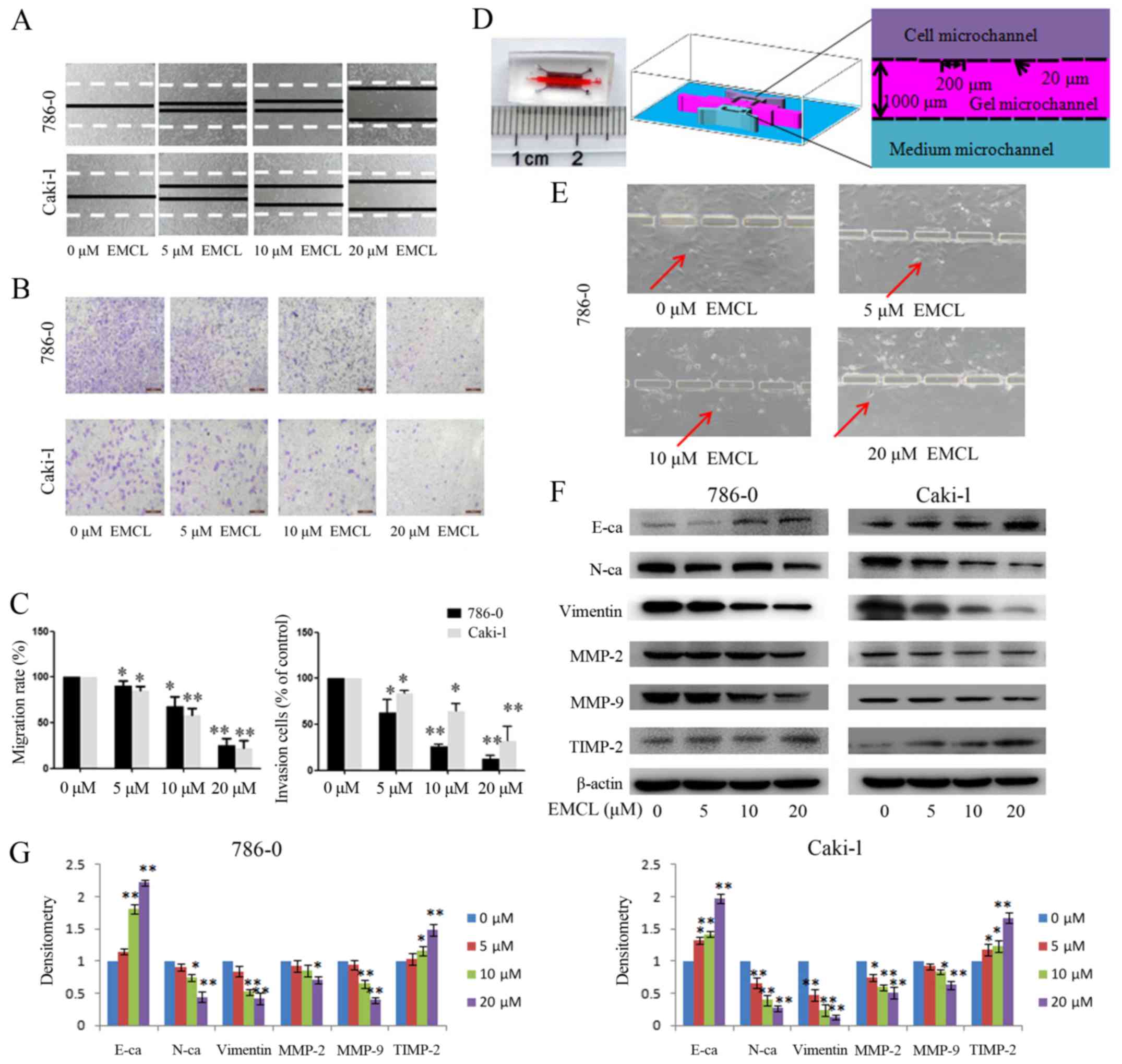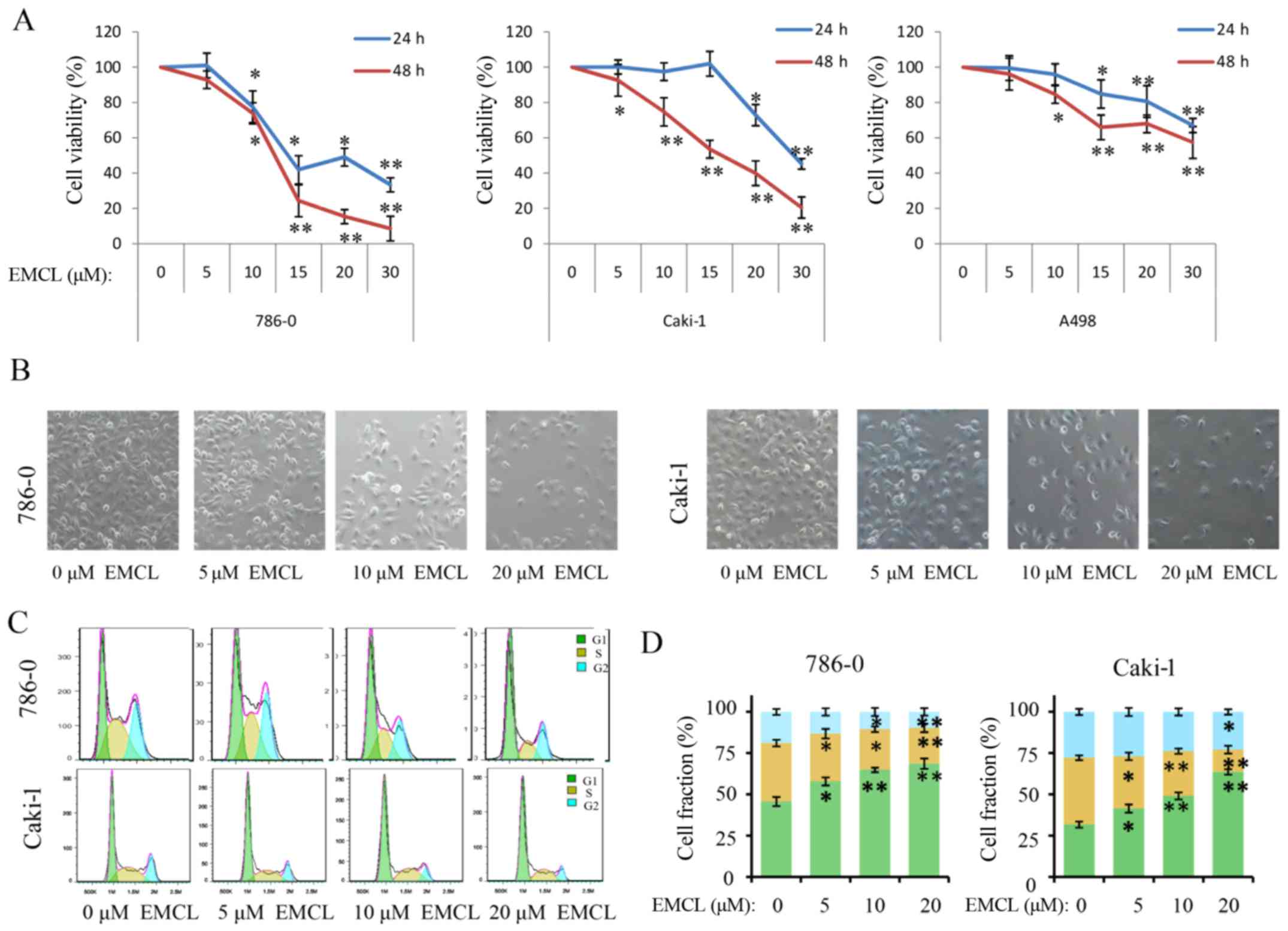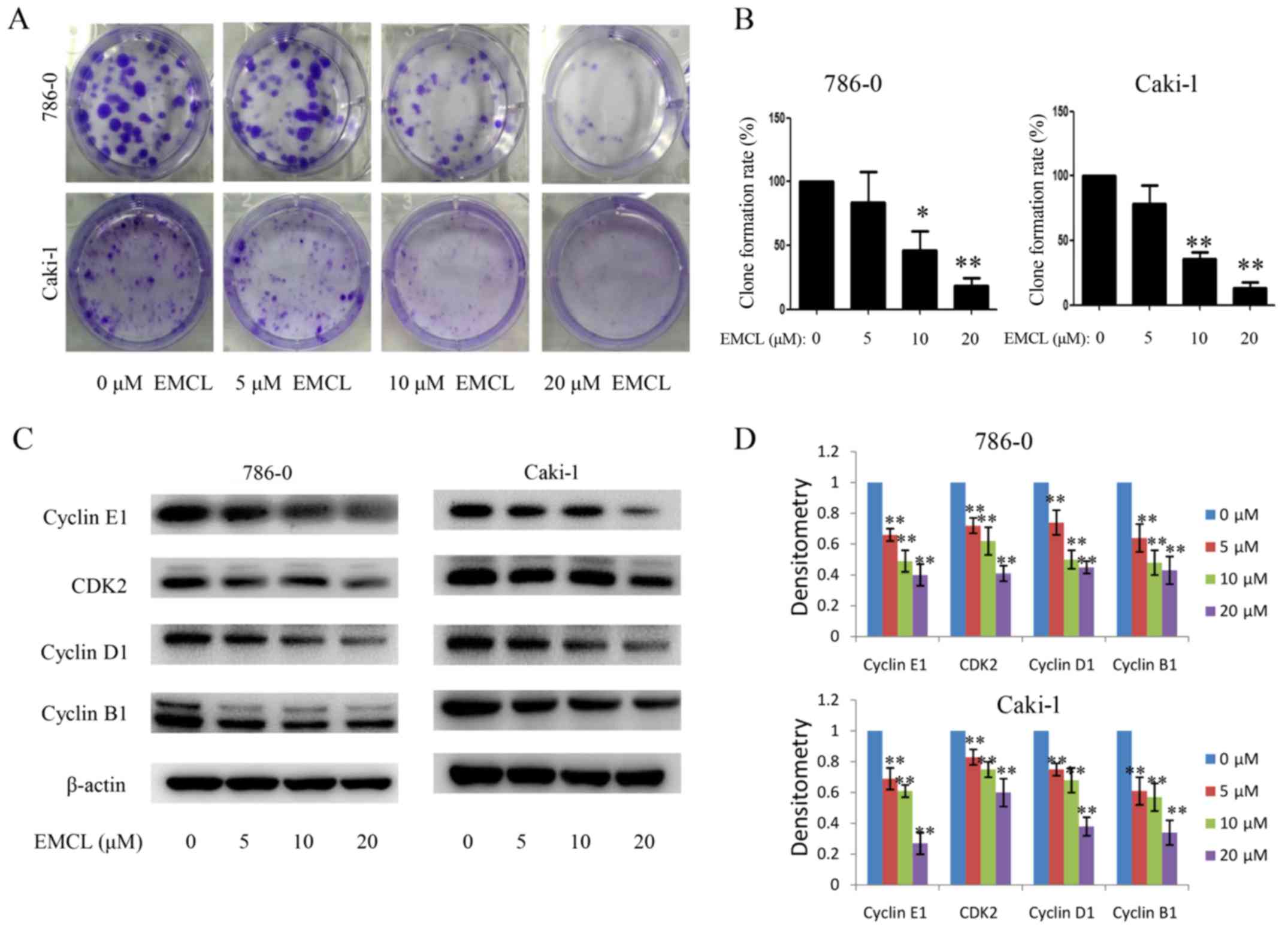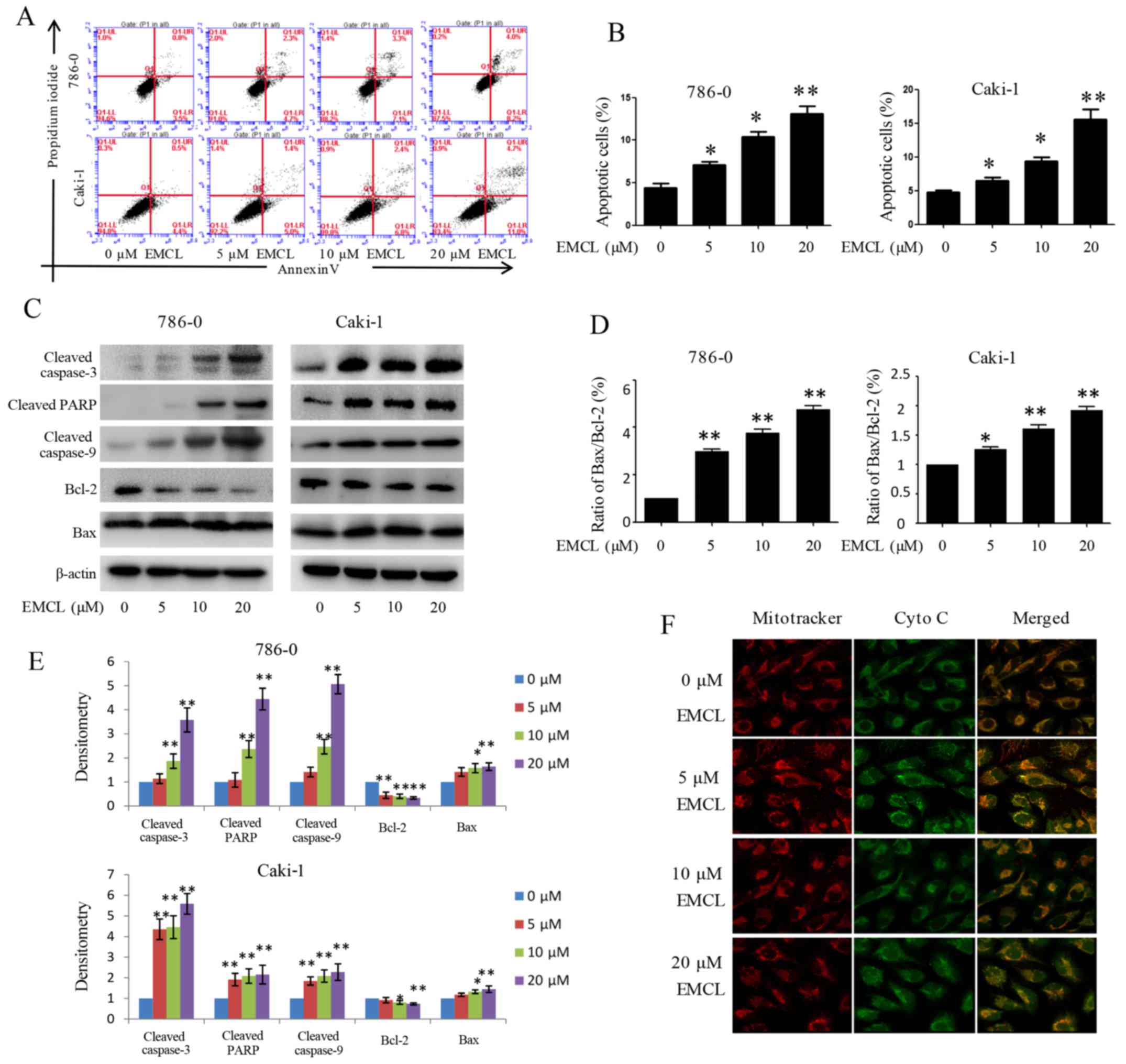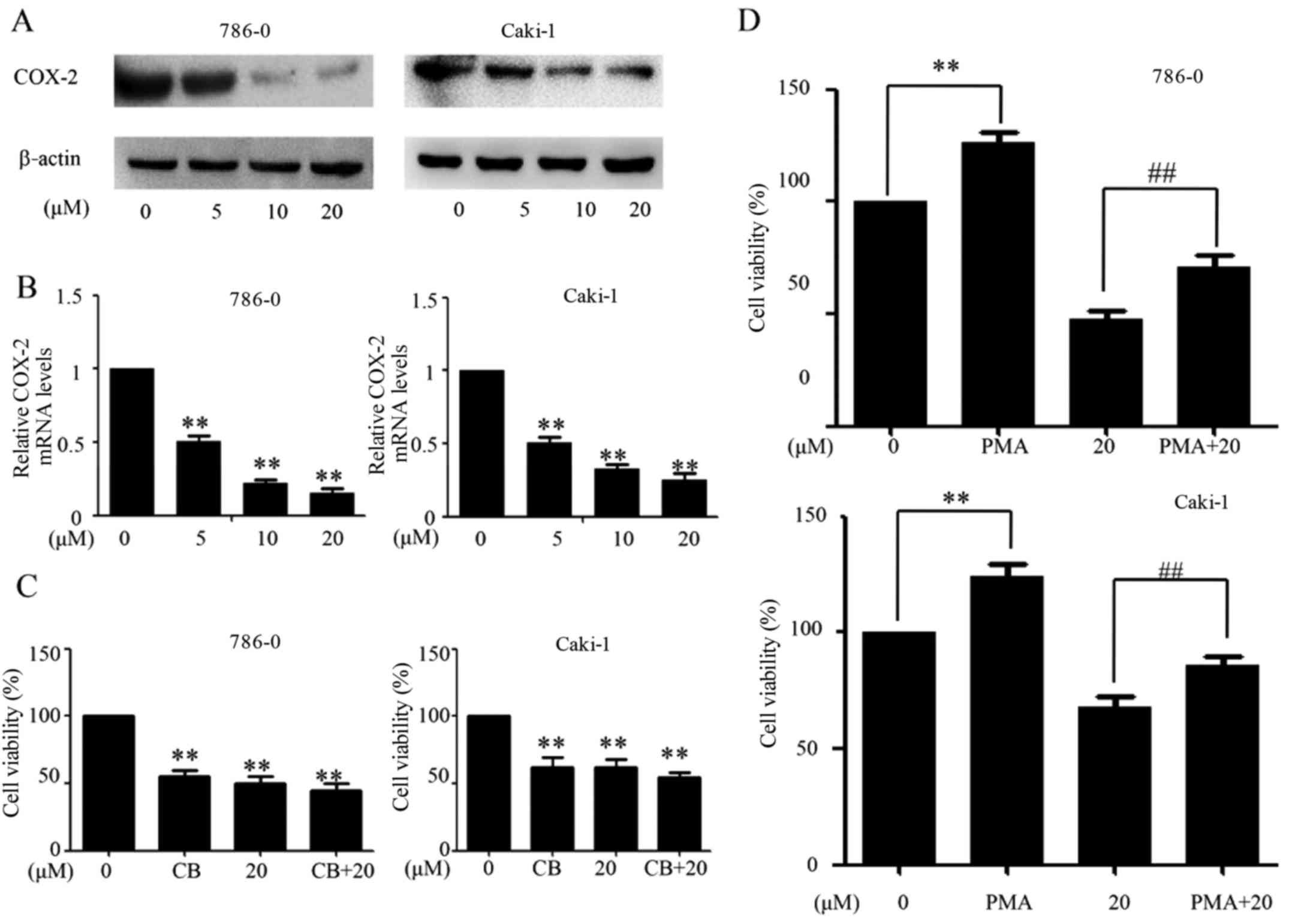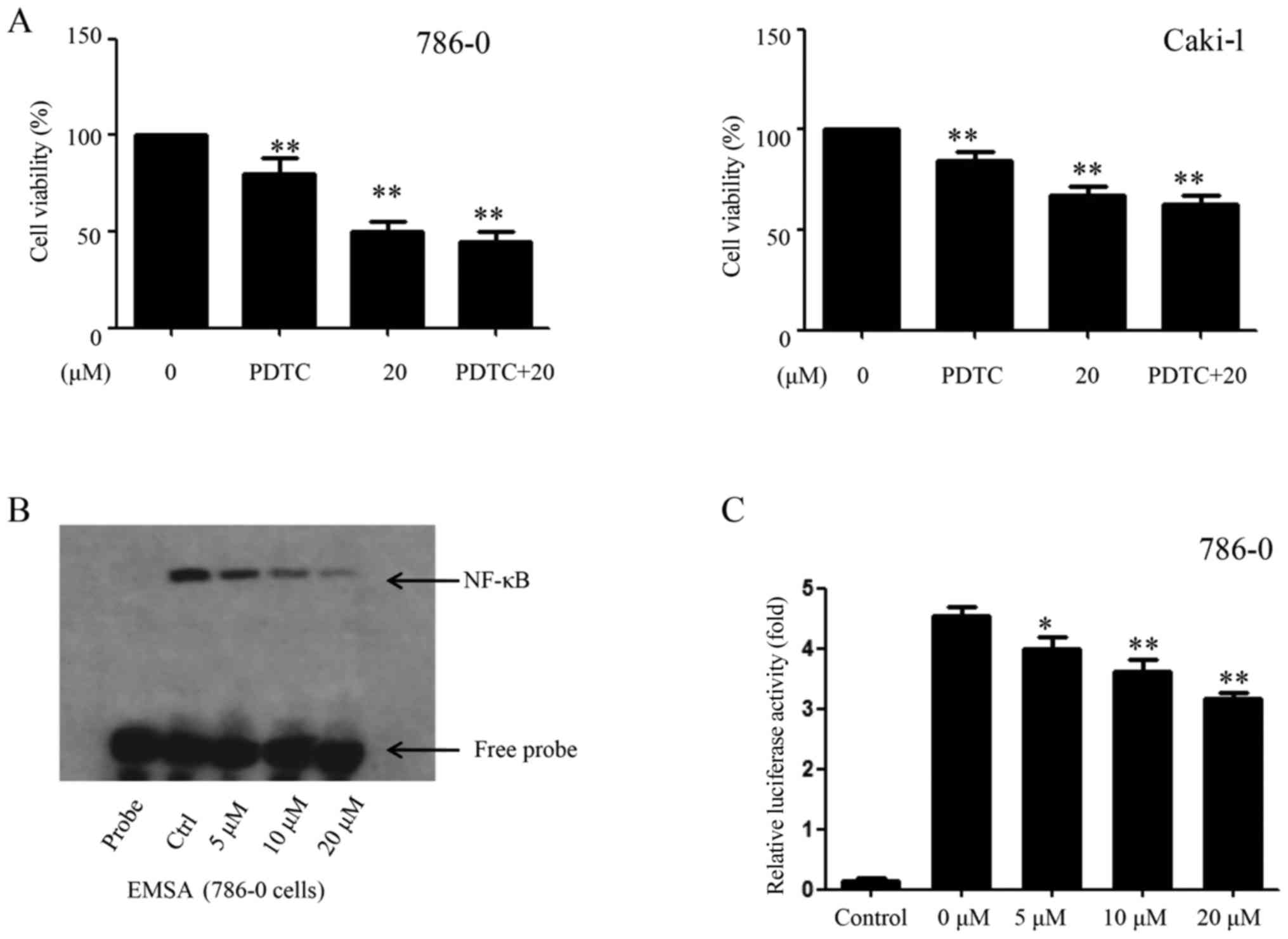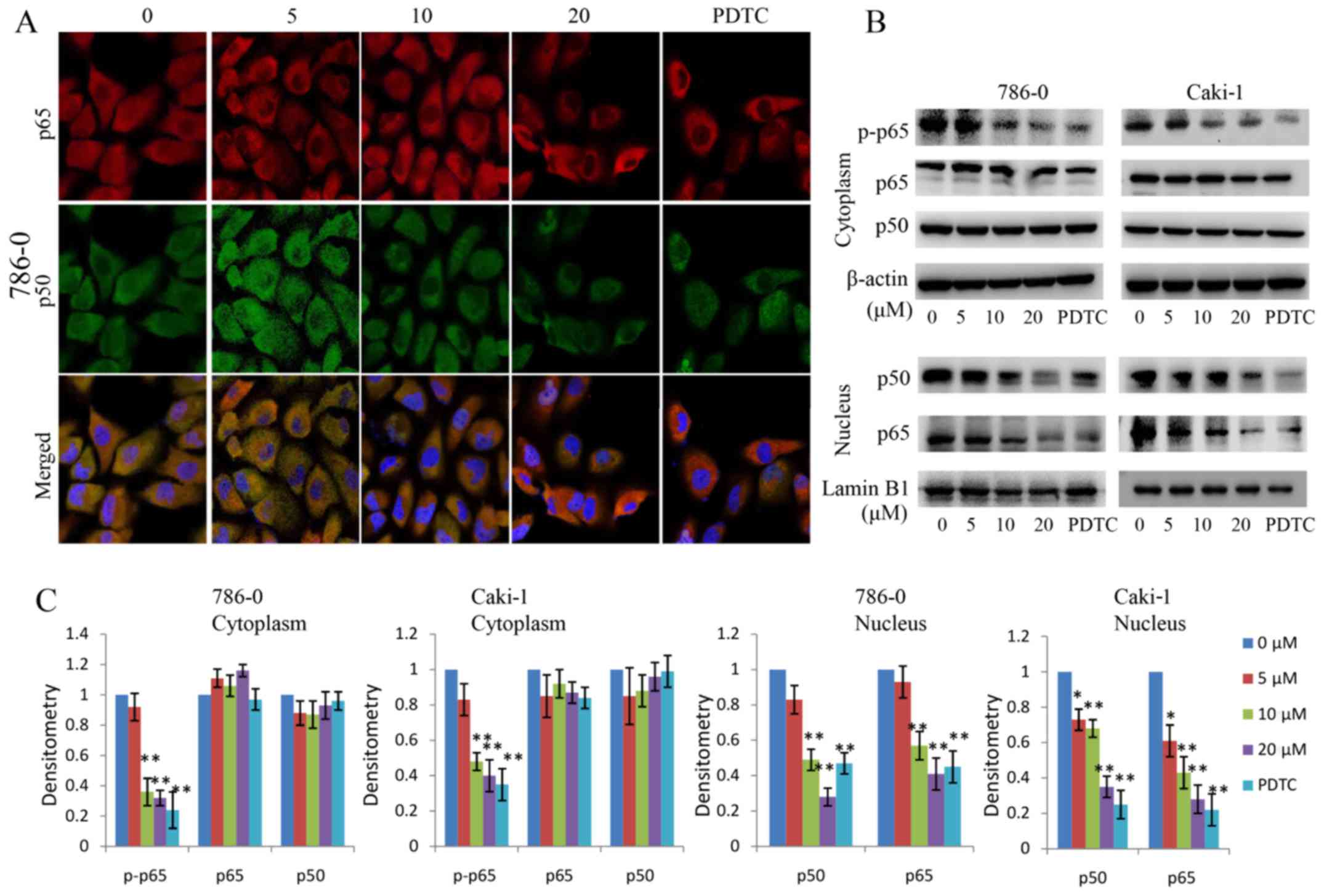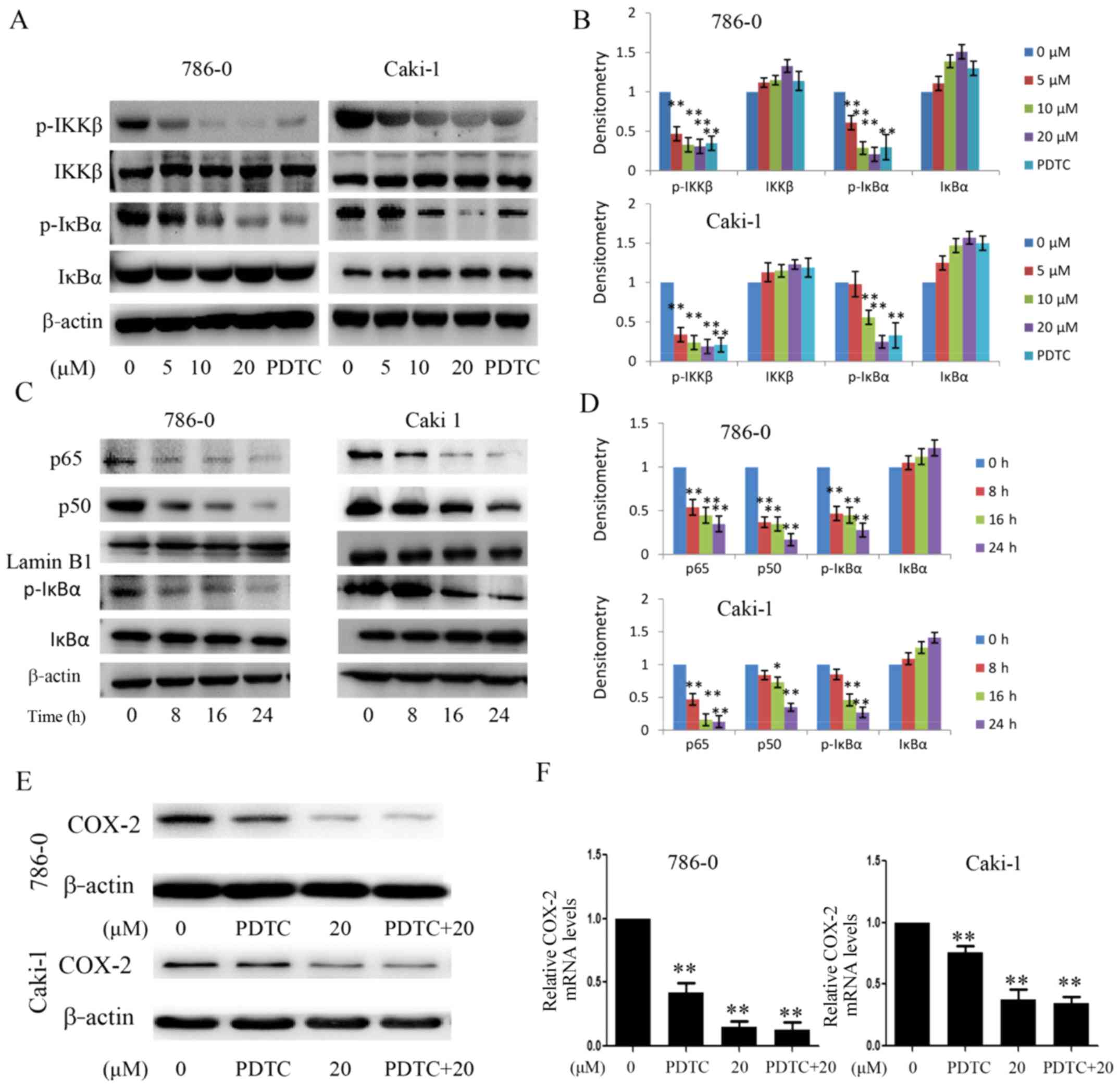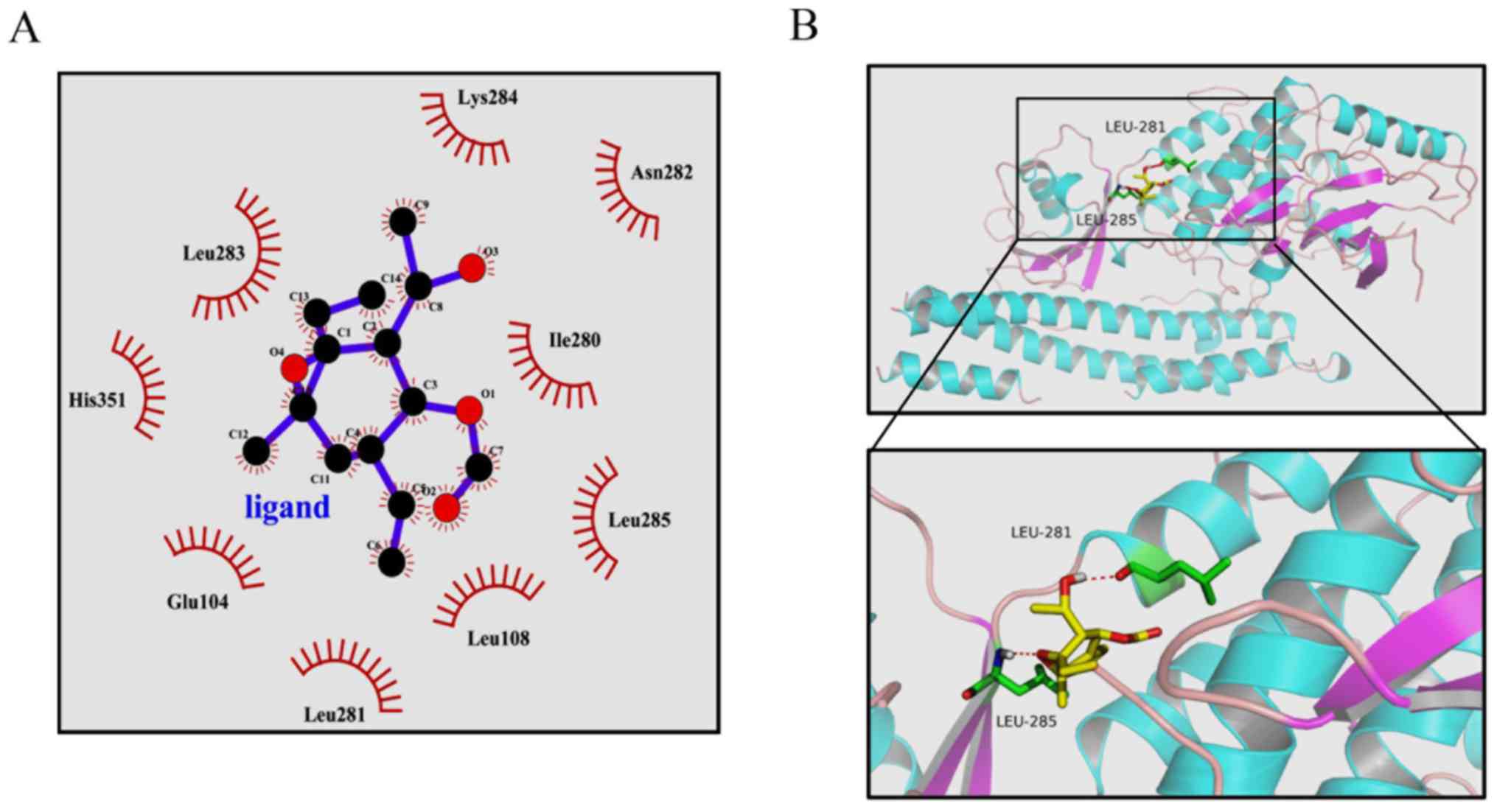|
1
|
Zhou S, Wang J and Zhang Z: An emerging
understanding of long noncoding RNAs in kidney cancer. J Cancer Res
Clin Oncol. 140:1989–1995. 2014. View Article : Google Scholar : PubMed/NCBI
|
|
2
|
Smaletz O: Current management and future
directions in the treatment of advanced renal cell carcinoma - a
latin american perspective: 10 years in review. Int Braz J Urol.
41:835–843. 2015. View Article : Google Scholar : PubMed/NCBI
|
|
3
|
Lu J, Wei JH, Feng ZH, Chen ZH, Wang YQ,
Huang Y, Fang Y, Liang YP, Cen JJ, Pan YH, et al: miR-106b-5p
promotes renal cell carcinoma aggressiveness and stem-cell-like
phenotype by activating Wnt/β-catenin signalling. Oncotarget.
8:21461–21471. 2017.PubMed/NCBI
|
|
4
|
Heinrich M, Robles M, West JE, Ortiz de
Montellano BR and Rodriguez E: Ethnopharmacology of Mexican
asteraceae (Compositae). Annu Rev Pharmacol Toxicol. 38:539–565.
1998. View Article : Google Scholar : PubMed/NCBI
|
|
5
|
Liao K, Xia B, Zhuang QY, Hou MJ, Zhang
YJ, Luo B, Qiu Y, Gao YF, Li XJ, Chen HF, et al: Parthenolide
inhibits cancer stem-like side population of nasopharyngeal
carcinoma cells via suppression of the NF-κB/COX-2 pathway.
Theranostics. 5:302–321. 2015. View Article : Google Scholar :
|
|
6
|
Saadane A, Masters S, DiDonato J, Li J and
Berger M: Parthenolide inhibits IkappaB kinase, NF-kappaB
activation, and inflammatory response in cystic fibrosis cells and
mice. Am J Respir Cell Mol Biol. 36:728–736. 2007. View Article : Google Scholar : PubMed/NCBI
|
|
7
|
Oka D, Nishimura K, Shiba M, Nakai Y, Arai
Y, Nakayama M, Takayama H, Inoue H, Okuyama A and Nonomura N:
Sesquiterpene lactone parthenolide suppresses tumor growth in a
xenograft model of renal cell carcinoma by inhibiting the
activation of NF-kappaB. Int J Cancer. 120:2576–2581. 2007.
View Article : Google Scholar : PubMed/NCBI
|
|
8
|
Lin M, Bi H, Yan Y, Huang W, Zhang G,
Zhang G, Tang S, Liu Y, Zhang L, Ma J, et al: Parthenolide
suppresses non-small cell lung cancer GLC-82 cells growth via
B-Raf/MAPK/Erk pathway. Oncotarget. 8:23436–23447. 2017.PubMed/NCBI
|
|
9
|
Kim SL, Kim SH, Park YR, Liu YC, Kim EM,
Jeong HJ, Kim YN, Seo SY, Kim IH, Lee SO, et al: Combined
parthenolide and balsalazide have enhanced antitumor efficacy
through blockade of NF-κB activation. Mol Cancer Res. 15:141–151.
2017. View Article : Google Scholar : PubMed/NCBI
|
|
10
|
Liu W, Wang X, Sun J, Yang Y, Li W and
Song J: Parthenolide suppresses pancreatic cell growth by
autophagy-mediated apoptosis. OncoTargets Ther. 10:453–461. 2017.
View Article : Google Scholar
|
|
11
|
Pei S, Minhajuddin M, D'Alessandro A,
Nemkov T, Stevens BM, Adane B, Khan N, Hagen FK, Yadav VK, De S, et
al: Rational design of a parthenolide-based drug regimen that
selectively eradicates acute myelogenous leukemia stem cells. J
Biol Chem. 291:21984–22000. 2016. View Article : Google Scholar : PubMed/NCBI
|
|
12
|
Jeyamohan S, Moorthy RK, Kannan MK and
Arockiam AJ: Parthenolide induces apoptosis and autophagy through
the suppression of PI3K/Akt signaling pathway in cervical cancer.
Biotechnol Lett. 38:1251–1260. 2016. View Article : Google Scholar : PubMed/NCBI
|
|
13
|
Jin P, Madieh S and Augsburger LL: The
solution and solid state stability and excipient compatibility of
parthenolide in feverfew. AAPS PharmSciTech. 8:E1052007. View Article : Google Scholar
|
|
14
|
Yu Z, Guo W, Ma X, Zhang B, Dong P, Huang
L, Wang X, Wang C, Huo X, Yu W, et al: Gamabufotalin, a
bufadienolide compound from toad venom, suppresses COX-2 expression
through targeting IKKβ/NF-κB signaling pathway in lung cancer
cells. Mol Cancer. 13:2032014. View Article : Google Scholar
|
|
15
|
Karin M: Nuclear factor-kappaB in cancer
development and progression. Nature. 441:431–436. 2006. View Article : Google Scholar : PubMed/NCBI
|
|
16
|
Mantovani A, Allavena P, Sica A and
Balkwill F: Cancer-related inflammation. Nature. 454:436–444. 2008.
View Article : Google Scholar : PubMed/NCBI
|
|
17
|
Kankaya D, Kiremitci S, Tulunay O and
Baltaci S: Gelsolin, NF-κB, and p53 expression in clear cell renal
cell carcinoma: Impact on outcome. Pathol Res Pract. 211:505–512.
2015. View Article : Google Scholar : PubMed/NCBI
|
|
18
|
Peri S, Devarajan K, Yang DH, Knudson AG
and Balachandran S: Meta-analysis identifies NF-κB as a therapeutic
target in renal cancer. PLoS One. 8:e767462013. View Article : Google Scholar
|
|
19
|
Ohshima H, Tazawa H, Sylla BS and Sawa T:
Prevention of human cancer by modulation of chronic inflammatory
processes. Mutat Res. 591:110–122. 2005. View Article : Google Scholar : PubMed/NCBI
|
|
20
|
Surh YJ, Chun KS, Cha HH, Han SS, Keum YS,
Park KK and Lee SS: Molecular mechanisms underlying chemopreventive
activities of anti-inflammatory phytochemicals: Down-regulation of
COX-2 and iNOS through suppression of NF-kappa B activation. Mutat
Res. 480–481:243–268. 2001. View Article : Google Scholar
|
|
21
|
Dannenberg AJ, Altorki NK, Boyle JO, Dang
C, Howe LR, Weksler BB and Subbaramaiah K: Cyclo-oxygenase 2: A
pharmacological target for the prevention of cancer. Lancet Oncol.
2:544–551. 2001. View Article : Google Scholar
|
|
22
|
Williams CS, Mann M and DuBois RN: The
role of cyclooxygenases in inflammation, cancer, and development.
Oncogene. 18:7908–7916. 1999. View Article : Google Scholar
|
|
23
|
Erdem H, Aydin HR, Bahadir A, Gündogdu B,
Balta H, Sener E, Kayikci MA, Albayrak A and Erdogan F:
Relationship of CD95 and COX-2 in renal cell carcinomas with
survival and other prognostic parameters: A tissue microarray
study. J Pak Med Assoc. 65:597–601. 2015.PubMed/NCBI
|
|
24
|
Yang S, Gao Q and Jiang W: Relationship
between tumour angiogenesis and expression of cyclo-oxygenase-2 and
vascular endothelial growth factor-A in human renal cell carcinoma.
J Int Med Res. 43:110–117. 2015. View Article : Google Scholar
|
|
25
|
Shrestha S, Zhu J, Wang Q, Du X, Liu F,
Jiang J, Song J, Xing J, Sun D, Hou Q, et al: Melatonin potentiates
the antitumor effect of curcumin by inhibiting IKKβ/NF-κB/COX-2
signaling pathway. Int J Oncol. 51:1249–1260. 2017. View Article : Google Scholar : PubMed/NCBI
|
|
26
|
Zhao H, Wang J, Kong X, Li E, Liu Y, Du X,
Kang Z, Tang Y, Kuang Y, Yang Z, et al: CD47 promotes tumor
invasion and metastasis in non-small cell lung cancer. Sci Rep.
6:297192016. View Article : Google Scholar : PubMed/NCBI
|
|
27
|
Livak KJ and Schmittgen TD: Analysis of
relative gene expression data using real-time quantitative PCR and
the 2(−Delta Delta C(T)) Method. Methods. 25:402–408. 2001.
View Article : Google Scholar
|
|
28
|
Hu Q, Hou YC, Huang J, Fang JY and Xiong
H: Itraconazole induces apoptosis and cell cycle arrest via
inhibiting Hedgehog signaling in gastric cancer cells. J Exp Clin
Cancer Res. 36:502017. View Article : Google Scholar : PubMed/NCBI
|
|
29
|
Wang X, Yu Z, Wang C, Cheng W, Tian X, Huo
X, Wang Y, Sun C, Feng L, Xing J, et al: Alantolactone, a natural
sesquiterpene lactone, has potent antitumor activity against
glioblastoma by targeting IKKβ kinase activity and interrupting
NF-κB/COX-2-mediated signaling cascades. J Exp Clin Cancer Res.
36:932017. View Article : Google Scholar
|
|
30
|
Zhang C, Su ZY, Wang L, Shu L, Yang Y, Guo
Y, Pung D, Bountra C and Kong AN: Epigenetic blockade of neoplastic
transformation by bromodomain and extra-terminal (BET) domain
protein inhibitor JQ-1. Biochem Pharmacol. 117:35–45. 2016.
View Article : Google Scholar : PubMed/NCBI
|
|
31
|
Knight DW: Feverfew: Chemistry and
biological activity. Nat Prod Rep. 12:271–276. 1995. View Article : Google Scholar : PubMed/NCBI
|
|
32
|
Boolbol SK, Dannenberg AJ, Chadburn A,
Martucci C, Guo XJ, Ramonetti JT, Abreu-Goris M, Newmark HL, Lipkin
ML, DeCosse JJ, et al: Cyclooxygenase-2 overexpression and tumor
formation are blocked by sulindac in a murine model of familial
adenomatous polyposis. Cancer Res. 56:2556–2560. 1996.PubMed/NCBI
|
|
33
|
Zimmermann KC, Sarbia M, Weber AA,
Borchard F, Gabbert HE and Schrör K: Cyclooxygenase-2 expression in
human esophageal carcinoma. Cancer Res. 59:198–204. 1999.PubMed/NCBI
|
|
34
|
Heiss E, Herhaus C, Klimo K, Bartsch H and
Gerhäuser C: Nuclear factor kappa B is a molecular target for
sulforaphane-mediated anti-inflammatory mechanisms. J Biol Chem.
276:32008–32015. 2001. View Article : Google Scholar : PubMed/NCBI
|
|
35
|
Lee DF and Hung MC: Advances in targeting
IKK and IKK-related kinases for cancer therapy. Clin Cancer Res.
14:5656–5662. 2008. View Article : Google Scholar : PubMed/NCBI
|
|
36
|
Horejs CM: Basement membrane fragments in
the context of the epithelial-to-mesenchymal transition. Eur J Cell
Biol. 95:427–440. 2016. View Article : Google Scholar : PubMed/NCBI
|
|
37
|
Gomez DE, Alonso DF, Yoshiji H and
Thorgeirsson UP: Tissue inhibitors of metalloproteinases:
Structure, regulation and biological functions. Eur J Cell Biol.
74:111–122. 1997.PubMed/NCBI
|















